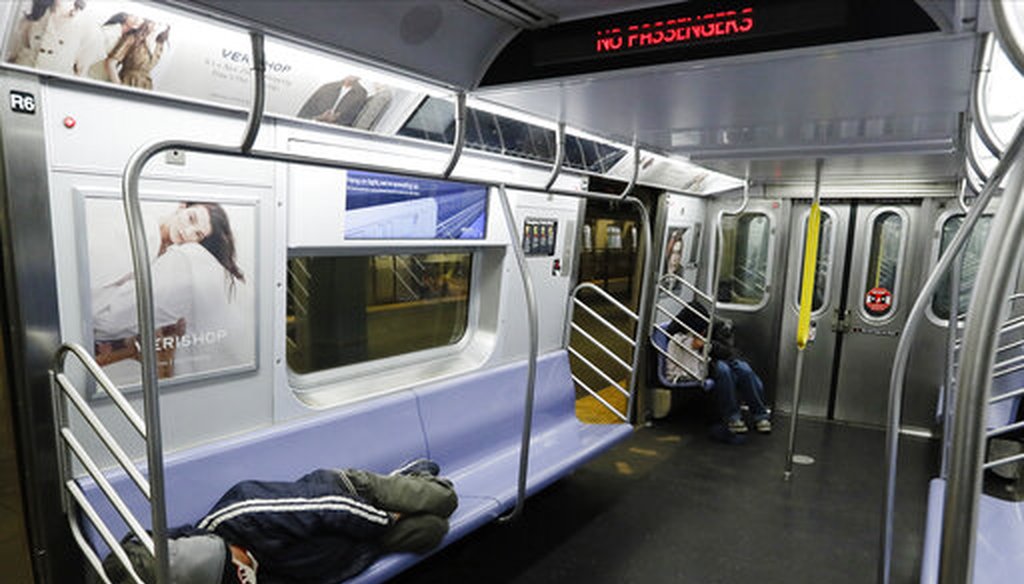

Our only agenda is to publish the truth so you can be an informed participant in democracy.
We need your help.


Homeless New Yorkers sleep on a train in Brooklyn on May 6, 2020. (AP)
• The number of hotel rooms being used for housing homeless New Yorkers is well short of the tens of thousands of rooms needed to house all of New York City’s homeless population.
• The main reason is the high cost, although the city has modestly increased the number of homeless individuals it has moved into hotels since the onset of the pandemic.
New York City has been hit especially hard by coronavirus, and the city’s homeless population in particular has struggled to comply with social distancing practices that public health officials have urged to contain the pandemic.
In an urgent letter to Mayor Bill de Blasio and Gov. Andrew Cuomo on April 3, 2020, a group of service and advocacy groups pressed for action.
The letter, spearheaded by the New York City-based Coalition for the Homeless, said that only 16.8% of New York City hotel rooms were occupied at the time, leaving more than 100,000 rooms empty. Yet at the same time, the groups said, more than 3,588 people were living on the streets and over 19,000 were living in shelters.
Five days later, Giselle Routhier, the policy director for the Coalition for the Homeless, told the New York Daily News, "We could open up tens of thousands of hotel rooms and offer every single person on the subway access to them. The mayor has absolutely to this point refused to do that."
Is this accurate? Yes, though the assertion needs some additional context. (The mayor’s office did not respond to inquiries for this article.)
There is longstanding precedent for the city paying hotels to provide emergency housing for New York City residents. In 2018, for instance, the city spent $364 million on annual contracts for emergency housing in hotels for homeless New Yorkers.
The challenge is the expense of paying for these hotel rooms.
"The city has routinely used hotels as ‘emergency’ housing, but the cost has been exorbitant, ranging from $170 to $250 per night for one dwelling unit," Roderick M. Hills Jr., a New York University law professor, told PolitiFact.
On April 23, Erin Drinkwater, the city’s deputy commissioner of the Department of Social Services, testified that prior to the coronavirus pandemic, the department paid $17 million per month to rent approximately 3,500 double-occupancy hotel rooms for homeless single adults.
Under proposed legislation requiring single-occupancy rooms, that cost would increase to $28 million per month, due to the cost of additional hotel rooms as well as security and operational needs, Drinkwater testified.
In her testimony, Drinkwater said that in addition to the 3,500 individuals already living in hotels, the city planned to move another 2,500 individuals — including people over 70, those with underlying health conditions, and those staying in the 10 most densely populated city shelters — to hotels by the end of April.
The Coalition for the Homeless told PolitiFact that Routhier’s reference to tens of thousands of hotel rooms was not the number simply to house "every single person on the subway," but rather the entire homeless population throughout the city, which is estimated to exceed 22,000. The group did not provide a specific number of homeless New Yorkers living in the subway system.
"The coalition has called for (hotels) to be used not only for homeless New Yorkers sheltering in the subway system, but also the many thousands more in congregate homeless shelters where social isolation is impossible and where Covid-19 is spreading," said Dan Levitan, a spokesman for the coalition.
A complication is that some hotel rooms have been converted for hospital use. The city said it planned to convert 250 hotel rooms in five hotels into hospital facilities, the Daily News reported on March 19.
Routhier said, "We could open up tens of thousands of hotel rooms and offer every single person on the subway access to them. The mayor has absolutely to this point refused to do that."
The city already does contract with hotels to house New Yorkers facing emergency homelessness, and the number of homeless individuals the city has moved into hotels has increased since the onset of the pandemic.
However, the number of rooms being used for this purpose is well short of the "tens of thousands" of rooms needed to house all of New York City’s homeless population. The main reason is the high cost.
We rate the statement Mostly True.
New York Daily News, "Convert empty NYC hotels to triage sites for coronavirus, advocates demand," March 19, 2020
New York Post, "Hundreds of homeless with coronavirus or symptoms housed at NYC hotels," April 6, 2020
Medium, "Getting a Better Deal for Homeless New Yorkers and New York Tax Payers," March 16, 2018
The Intercept, "Mayor Bill de Blasio says New York City can’t afford hotel rooms for the homeless — but FEMA could actually foot the bill," May 1, 2020
Coalition for the Homeless, "Housing, Health Care, & Other Advocates Call on Mayor de Blasio & Governor Cuomo to Open Vacant Hotel Rooms for Sick and Vulnerable Homeless New Yorkers During COVID-19 Crisis," April 3, 2020
Email interview with Roderick M. Hills Jr., a New York University law professor, May 1, 2020
Email interview with Dan Levitan, spokesman for the Coalition for the Homeless, May 3, 2020
In a world of wild talk and fake news, help us stand up for the facts.
